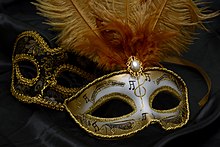
| Part of a series on |
| Costume |
|---|
 |
| Background |
| Society and culture |
| Design |
| Elements and methods |
Traditional
|
| Theatrical |
| Period |
| Children |
| Fictional |
| Organizations |
| Awards |
| People |
Museums
|
A domino mask is a small and (often) rounded mask covering only the area around the eyes and the space between them. The mask has seen special prevalence since the 18th century, when it became traditional wear in particular local manifestations of Carnival, particularly with Venetian Carnival, as part of a domino costume, which included the mask and a black cloak. Domino masks have found their way into a variety of high and popular art forms.
Name
The name is believed to derive from the Latin dominus, for "lord". The exact derivation is unknown.
History
See also: Carnival of Venice § Carnival masks| This section needs expansion. You can help by adding to it. (October 2014) |

Domino masks are worn during Carnival, e.g. at the Venetian Carnival, where it is part of the more extensive black (though occasionally white and blue) domino costume worn by both male and female participants, which accomplishes the requirement of the masquerade that participants be masked or otherwise disguised, and achieves the elements of adventure, conspiracy, intrigue, and mystery that are distinctive of the masquerade atmosphere; the costume includes the mask, as well as a cloak to envelope the body, and sometimes a hood (bahoo).
The domino mask has also found its way into the political landscapes of non-Western cultures via political cartooning, though likely through the earlier influences of popular (and therefore exported) 18th century and later European and American purveyors of the same genre: for instance, Johnny Hidajat, the Indonesian New Order cartoonist (e.g., for Pos Kota and Stop in Jakarta), consistently features the character Djon Domino, and a relationship between this character and the domino mask has been argued.
In art and other media
| This section needs expansion. You can help by adding to it. (October 2014) |

Domino masks have appeared in various images in art, such as La Femme au Masque, a painting by Henri Gervex in 1885. The subject is 22-year-old Parisienne Marie Renard wearing only a domino mask.
In the 1910 novel Le Fantôme de l'Opera (The Phantom of the Opera), Christine Daaé instructs her childhood sweetheart, Raoul, to wear a "domino" (presumably a mask and cape) to meet her, as she is trying to hide their relationship from the jealous "Opera Ghost" who is stalking her.
The mask is popular in superhero comics, where it is often worn by costumed heroes and villains such as Zorro, The Lone Ranger, Robin the Boy Wonder and the Green Hornet with the implication that they hide the hero's secret identity
See also
References
- "Definition of domino". www.merriam-webster.com. Retrieved 2019-06-11.
- Aileen Ribiero, 1984, The Dress Worn at Masquerades in England 1730 to 1790 (New York, NY:Garland Published), pp. 3, 29.
- Terry Castle, 1986, Masquerade and Civilization: the Carnivalesque in Eighteenth-Century English Culture and Fiction (Stanford, CA: Stanford University Press), p. 59.
- ^ Benedict R. O'g Anderson, 1991, Language and Power: Exploring Political Cultures in Indonesia, Cornell Press, pp. 157, 163, 167-170, ISBN 0801423546, see also ISBN 9793780401, , accessed 24 October 2014.
- "The Project Gutenberg eBook of The Phantom of the Opera", Project Gutenberg (October 1, 1994; accessed July 13, 2024).
- "So Many Masks", Comics in Crisis (May 16, 2011; accessed June 3, 2016)
External links
- "La bottega dei Mascareri" (The workshop of Mascareri/the Mask-makers), accessed 13 October 2014.
- "Student Project:General Commonalities in the Masquerade", accessed 13 October 2014.
- "History of Venetian Masks" at Masks of Venice retail site, accessed 13 October 2014.